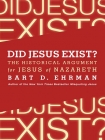Did Jesus Exist? - The Historical Argument for Jesus of Nazareth Bart Ehrman (books to read in your 20s txt) 📖

- Author: Bart Ehrman
Book online «Did Jesus Exist? - The Historical Argument for Jesus of Nazareth Bart Ehrman (books to read in your 20s txt) 📖». Author Bart Ehrman
I have explained these criteria used by scholars in part to show why Price’s opposing views are problematic. Contrary to Price, we do indeed have several traditions that probably reflect the life of the historical Jesus. In later chapters I will show there are many more. But at this stage I want to conclude by making an even larger methodological point: the question of whether many, most, or all the traditions about Jesus have been colored by legend is for the most part irrelevant to the question of whether Jesus existed.
You could make the case that every person who talks about another person puts his or her own slant on the story. Every story includes bias. We are humans, not machines, and we slant things the way we see them, necessarily. What that means, though, is that almost everything we say about another person is tinted with legend (our biases). It was no different with Jesus. People who told stories about him tinted his life with legend. Sometimes the legend completely took over, and the stories told were legendary through and through, with no historical core. Other times a historical core was shaped by a legendary interest. But there were indeed some stories with historical cores, and a scholar’s ability to show that even these stories are shaped by legend does not have any bearing on the question of whether Jesus existed. For one thing, we have the cores themselves. Moreover, and this is my key point, the shaping of a story is not the same thing as the inventing of a story. You can shape a tradition about Jesus any way you want so that it looks highly legendary. But that has no bearing on the question of whether beneath the legendary shaping lies the core of the historical event.
And—another key point that I want to keep pressing—the evidence of the historical Jesus does not in the least depend exclusively on whether this, that, or the other Gospel story is historically accurate. It is based on other considerations, which I set out in the earlier chapters, including the witness of Paul and the speeches of Acts, which long predate the Gospels.
In short, the problems that the Gospels pose for scholars—the fact we do not have the original texts, that we do not know their actual authors, that they are full of discrepancies, that they contain nonhistorical, legendary materials—are not all that significant for the particular question we are posing, whether or not Jesus existed. These problems may seem significant (and altogether relevant). But when you dig deeper into the matter and think about it more closely, it is clear that they are not.
Claim 2: Nazareth Did Not Exist
ONE SUPPOSEDLY LEGENDARY FEATURE of the Gospels relates closely to what I have just argued and is in fact one of the more common claims found in the writings of the mythicists. It is that the alleged hometown of Jesus, Nazareth, in fact did not exist but is itself a myth (using the term as the mythicists do). The logic of this argument, which is sometimes advanced with considerable vehemence and force, appears to be that if Christians made up Jesus’s hometown, they probably made him up as well. I could dispose of this argument fairly easily by pointing out that it is irrelevant. If Jesus existed, as the evidence suggests, but Nazareth did not, as this assertion claims, then he merely came from somewhere else. Whether Barack Obama was born in the United States or not (for what it is worth, he was) is irrelevant to the question of whether he was born.
Since, however, this argument is so widely favored among mythicists, I want to explore it more deeply. It is not a new argument. All the way back in 1906 Schweitzer addressed it when discussing the mythicists of his own day.8 Among the modern advocates of the view are several we have already mentioned. Frank Zindler, for example, in a cleverly titled essay, “Where Jesus Never Walked,” tries to deconstruct on a fairly simple level the geographical places associated with Jesus, especially Nazareth. He claims that Mark’s Gospel never states that Jesus came from Nazareth. This flies in the face, of course, of Mark 1:9, which indicates that this is precisely where Jesus came from (“Jesus came from Nazareth in Galilee”), but Zindler maintains that that verse was not originally part of Mark; it was inserted by a later scribe. Here again we see history being done according to convenience. If a text says precisely what you think it could not have said, then all you need to do is claim that originally it must have said something else.9
Zindler maintains that some early Christians understood Jesus to be the “branch” mentioned in Isaiah 11:1, who would come from the line of David as the messiah. The term branch in Hebrew (which does not have vowels) is spelled NZR, which is close (kind of close) to Nazareth. And so what happened, in Zindler’s view, is that later Christians who did not understand what it meant to call Jesus the NZR (branch) thought that the traditions that called him that were saying he was from a (nonexistent) town, Nazareth.
Zindler does not marshal any evidence for this view but simply asserts it. And he does not explain why Christians who did not know what NZR meant simply didn’t ask someone. Even more important, he doesn’t explain why they made up the name of a nonexistent town (in his view) to locate Jesus or how they went from “Jesus is the NZR” to “Jesus came from Nazareth.” The view seems completely implausible, especially given the fact, which we have seen, that multiple independent sources locate Jesus in Nazareth.





Comments (0)